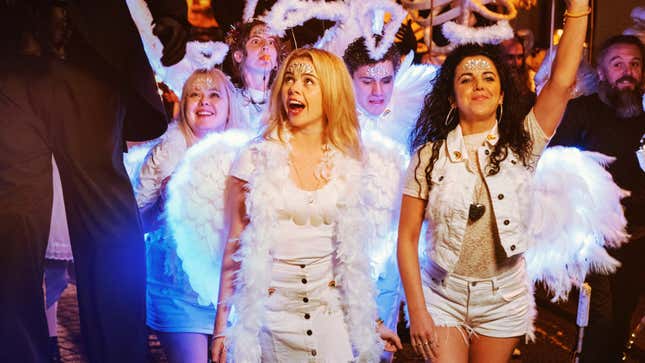
There isn’t another teen comedy quite like Derry Girls. A hilarious and hyper-specific ’90s nostalgia trip, it’s focused on the four titular Derry girls and one “wee English fella.” The series, which returns to Netflix in the U.S. today for its third and (sadly) final season after airing in the U.K. earlier this year, is partly inspired by creator Lisa McGee’s upbringing in Northern Ireland during The Troubles, and its appeal lies in the unabashed ways the show celebrates the universal joys (and nuisances) of female adolescence.
McGee’s crackerjack writing throughout Derry Girls is somehow both immersive and expansive. She precisely captures the quirks of her Northern Ireland hometown, but geographical boundaries don’t limit the show’s messaging and sentiments. After all, being a teen is a dumpster fire no matter where in the world you suffer through it.
The BAFTA-nominated series quickly became the most-watched TV show in modern Northern Ireland after its 2018 premiere. And its popularity ballooned after Netflix put it on a global platform because, first and foremost, Derry Girls is laugh-out-loud funny and remains so until the end. In the final seven episodes, the girls and their unlikely English lad get to mature without losing any of their eccentricities. (Side note: get ready for a couple of unbelievable cameos in season three, the details of which won’t be spoiled here).
The show’s beauty lies in an effervescent portrait of friendship, with the flawless cast’s comedic spark crackling through the screen. Their chemistry radiates whether they’re dancing onstage, arguing before exams, or simply walking from home to school and back. As we said, their coming-of-age years occur during The Troubles, and as that conflict drags on—a bridge is bombed on the first day of school, the bus passes various military checkpoints, etc.—these young adults have no choice but to live their lives, attend an all-girls Catholic school, and perhaps most importantly, be as cool as they possibly can.
Derry Girls’ entertaining teens—Erin (Saoirse-Monica Jackson), her cousin Orla (Louisa Harland), and friends Clare (Nicola Coughlan) and Michelle (Jamie-Lee O’Donnell)—have a knack for landing in bizarre situations. Their group adds a new member when Michelle’s cousin, James (Dylan Llewellyn), moves from London to join them at Our Lady Immaculate College. He’s a shy dude forced to enroll in an all-girls school out of fear that boys will bully him for being an English lad. Don’t worry, the girls don’t go easy on him either. (Michelle tells him when they’re studying history: “If your lot had stopped invading for five fucking minutes, there’d be a lot less to wade through.” Almost everyone on this planet can relate.)
Derry Girls offers an excellent snapshot of the ’90s Derry bubble, aided by shooting on location. The residents are close-knit, with some irrational and hilarious rivalries. The school gets a wry headmistress, Sister George Michael (played perfectly by Siobhán McSweeney), and a version of Hot Priest in Father Peter Conway (Peter Campion). Erin’s family spends time in the spotlight, but not so much that it takes away from the teen-comedy aspect. The on-point Irish jargon (helpful tip: keep the subtitles on) makes Derry Girls more immersive. The town boasts a singular personality, shaping the characters strongly in turn.
The news is always on in the background, depicting real-life events, from parades and fights to Bill Clinton’s visit in 1995. The fantastic second-season finale is structured around the president’s arrival as the teens excitedly gather to see how he helps in the peace process. During this episode, James considers moving back to London to live with his mother, but his friends convince him to stay. When he claims he still feels out of place, Michelle poignantly tells him: “Being a Derry girl is a state of mind.” And that right there, folks, is the line of the show.

While Derry Girls’ idiosyncracies are tied to a time period, location, and culture, the show is actually about connections formed during a pivotal time. Erin, Orla, Clare, Michelle, and James are bound together by their school and hometown. Unfortunately, they’re also bound by the violence and death that’s engulfed them, and there’s nothing they can do about it. (Unlike us, they can’t even tweet their way through such situations.) The show taps into this ubiquitous emotion. And in this case, they’re worried about GCSE grades, scoring tickets to Fatboy Slim’s Halloween concert, and sorting through first crushes and kisses.
Derry Girls doesn’t dismiss the seriousness of the conflict, though. On the contrary, it takes every opportunity to remind us it’s happening. But it’s tackled with buoyancy. So when news of another fatal bombing breaks, it’s when the girls are blissfully performing aerobics onstage. When they get involved in a ridiculous Carrie-like scene at prom, their families rejoice over a potential ceasefire. The parallel displays are plentiful—and they’re sublime and insightful.
As season three kicks off, the Troubles are almost over, and our protagonists are about to turn 18. What do they do now that peace is looming and adulthood is staring them in the face, threatening to change everything about the world as they know it? Derry Girls explores this new challenge with delightful humor and grit. The impeccable writing pays homage to Irish history, and crucially honors the legacy of female friendships (and their one English fella), especially those formed in hallowed hallways and during sleepovers. It will be missed.